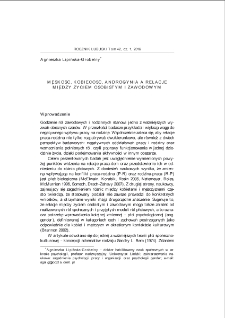Zielonogórska Biblioteka Cyfrowa udostępnia 65 553 obiektów cyfrowych
Obiekt
Tytuł: Męskość, kobiecość, androgynia a relacje między życiem osobistym i zawodowym = Masculinity, femininity, androgyny and relationships between work and family life
Współtwórca:
Paprzycka, Emilia - red. ; Mianowska, Edyta - red.
Tytuł publikacji grupowej:
Streszczenie:
Celem badań przedstawionych w artykule jest sprawdzenie, czy płeć biologiczna i płeć psychologiczna różnicują relacje pomiędzy pracą a domem. Wspomniane relacje będą analizowane zarówno z perspektywy negatywnej (konflikt i negatywne przenoszenie się ról), jak i z perspektywy pozytywnej (pozytywne przenoszenie się między rolami). W badaniu wzięło udział 436 osób (218 kobiet i 218 mężczyzn). ; Z badań wynika, że płeć biologiczna różnicuje doświadczenie konfliktu praca-rodzina. Płeć różnicuje pozytywne skutki uboczne między pracą a rodziną i rodziną a pracą. Z kolei interakcja płci biologicznej i psychologicznej zmienia intensywność pozytywnego wpływu pracy na rodzinę. Uzyskane wyniki pokazują, że postrzeganie relacji zawodowych i rodzinnych zależy od płci psychologicznej i płci biologicznej, ale istnieją też domeny bez takich różnic.
Abstract:
The aim of the research presented in this article is to examine whether biological sex and psychological gender distinguish the relationship between work and home. The mentioned relationships will be analyzed both from the negative perspective (conflict and negative spillover between roles), as well as from the positive perspective (positive spillover between roles). The study involved 436 people (218 women and 218 men). ; Individuals completed the following research tools: a survey, the Masculinity and Femininity Scale by A. Lipinska-Grobelny and K. Gorczycka, the questionnaire Work-Family (W-F) and Family-Work (F-W) Conflict by R.G. Netemeyer, J.S. Boles and R. McMurrian and the Positive and Negative Work-Family and Family-Work Spillover by P. Moen, E. Kelly and R. Huang. ; The research shows that biological sex differentiates the experience of work-family conflict. Gender diversifies work-family and family-work positive spillover. In turn the interaction of biological sex and psychological changes the intensity of positive work-family spillover. The obtained results present that the perception of work and family relations depends on psychological gender and biological sex, but there are also domains without such differences.
Wydawca:
Zielona Góra: Lubuskie Towarzystwo Naukowe ; Zielona Góra: Uniwersytet Zielonogórski, Wydział Pedagogiki, Psychologii i Socjologii
Format:
Identyfikator zasobu:
Strony:
Jezyk:
Prawa do dysponowania publikacją:
Biblioteka Uniwersytetu Zielonogórskiego
Kolekcje, do których przypisany jest obiekt:
- Zielonogórska Biblioteka Cyfrowa > Repozytorium > Jednostki organizacyjne > Wydział Nauk Społecznych
- Zielonogórska Biblioteka Cyfrowa > Repozytorium > Typy utworów > Artykuły
- Zielonogórska Biblioteka Cyfrowa > Repozytorium > Czasopisma naukowe i serie wydawnicze UZ > Rocznik Lubuski
Data ostatniej modyfikacji:
24 maj 2024
Data dodania obiektu:
24 maj 2024
Liczba wyświetleń treści obiektu:
289
Wszystkie dostępne wersje tego obiektu:
https://www.zbc.uz.zgora.pl/publication/89074
Wyświetl opis w formacie RDF:
Wyświetl opis w formacie OAI-PMH:
Obiekty Podobne
Arcimowicz, Krzysztof Paprzycka, Emilia - red. Mianowska, Edyta - red.
Trzop, Beata Paprzycka, Emilia - red. Mianowska, Edyta - red.
Paprzycka, Emilia Mianowska, Edyta Izdebski, Zbigniew (1956- ) Paprzycka, Emilia - red. Mianowska, Edyta - red.
Dalasiński, Tomasz - red. Szwagrzyk, Aleksandra - red. Tański, Paweł - red.
Paprzycka, Emilia - red. Mianowska, Edyta - red. Kuczyńska, Alicja (1937 -) Kopciewicz, Lucyna Ostrouch-Kamińska, Joanna Arcimowicz, Krzysztof Dzwonkowska-Godula, Krystyna Izdebski, Zbigniew (1956- ) Maj, Agnieszka Kłonkowska, Anna M. Połeć, Wojciech Lipińska-Grobelny, Agnieszka Lipowicz, Elżbieta Frąckowiak-Sochańska, Monika Pawlak, Agnieszka (1971 -) Warat, Marta Krzaklewska, Ewa Post, Barbara Trzop, Beata Herudzińska, Małgorzata H. Albański, Łukasz Radziukiewicz, Anna Famuła-Jurczak, Anita Walentynowicz-Moryl, Katarzyna Bierca, Marta Niewiedział, Dorota Steciąg, Magdalena
Maciejewska, Tatiana
Walentynowicz-Moryl, Katarzyna Paprzycka, Emilia - red. Mianowska, Edyta - red.
Bierca, Marta Paprzycka, Emilia - red. Mianowska, Edyta - red.

